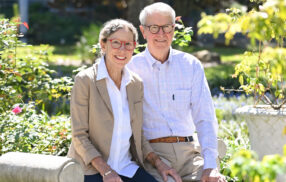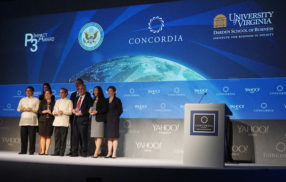
As Trust Falls, How Can Businesses Help Pick It Up?
By Dave Hendrick
These are dark days for trust in the bedrock institutions of global society.
While a general antipathy toward government and global business seemed to animate a series of surprising election results in 2016, recent surveys suggest that the already depressed state of the sentiment has fallen yet further.
Global communications firm Edelman, for instance, reported in early 2017 that its annual Trust Barometer showed the largest-ever drop of trust in global institutions of business, government, nonprofits and media.
Leadership, too, has fallen to crisis-like levels, with CEO credibility falling to an all-time low of 37 percent.
If one can find something like a bright spot in the Edelman research, it suggests that business continues to be held in some regard, with respondents calling the sector the only of the major institutions that can make a difference.
University of Virginia Darden School of Business professors have long studied the issue of trust in business, informing significant portions of their work as well as that of Darden’s Institute for Business in Society. Professors Andrew Wicks and Jared Harris and lecturer Brian Moriarty even edited the book Public Trust in Business.
In their 2014 book, Wicks, Moriarty and Harris call low levels of trust in business an “enduring phenomenon,” which is currently exacerbated by a complex combination of factors. Noting globalization, rapid changes in connectivity brought about by the Internet and increased concentrations of wealth within companies, the authors describe public trust in business as “a complex knot consisting of various knots and threads that reflect an environment of dynamic change.”
Little studied, the consequences of low levels of trust appear to be large and growing. The poorly trusted business invites additional and unwanted government scrutiny and regulation, finds increased difficulty in attracting and maintaining a talented workforce, and — perhaps of utmost concern to many business leaders —suffers reputation damage that has a clear correlation to valuation.
“Trust in business is important in a number of areas,” said Moriarty. “Research showed that the overall trust in a society contributes to the economic well-being in that society.”
Where Did It All Go Wrong?
Although trust in business and government has been in a distressed state for generations, Moriarty is among those who trace the recent trough period to the Great Recession of 2008, and the exacerbation of income inequality and loss of opportunity that came in its wake.
“For many people in the U.S, things have recovered pretty well, but for a lot of people what hasn’t recovered are the strong middle class jobs,” Moriarty said. “A number of people have felt left behind in the economy, and I think there is a lot of confusion about what causes this and even more confusion about what to do about it and how to fix it.”
The Darden lecturer and Institute for Business in Society director suggested increased levels of trust will be critical to move forward as the country grapples with a host of pressing issues. However, continued attacks on once trusted sources of information — seen in the pitched battle over so-called “fake news,” for instance — may make the task more difficult.
“Those types of approaches are very destructive of trust because what is key to trust is building common ground and a shared map of reality,” Moriarty said. “It’s about how we work together with the best picture of reality so we can determine what the best path is going forward.”
The shared map is particularly important, Moriarty said, given that the current landscape suggests a shift in societal expectations from government solving problems to some cooperative involving government, business and nonprofits, with each attempting to find their footing in the new space.
“There is in a sense an emerging social contract that is yet to be codified by any of these institutions, although the weight of its presence is being felt by all of them,” Moriarty said.
Although by some metrics trust in business is at a nadir, Moriarty said such multisector partnerships represent a hopeful sign amid the headwinds. Businesses and nonprofits, for instance, are far more likely to trust each other and partner on solving problems, which is the sort of collaboration that can ultimately play a role in fostering an environment in which the public sees fit to invest their trust.
What Is Darden’s Role Improving Trust?
The lessons of collaboration are instilled at Darden in courses and through initiatives like the Tri-Sector Leadership Fellows Program, and the School’s lived mission of inspiring and developing responsible leaders can ultimately help play a role in fostering a world where businesses are more trusted, Moriarty said.
While Darden’s culture and core courses have a long history of instilling responsible actions in students and graduates, the School added to its capabilities in 2016 by bringing on Professor Mary Gentile and her influential Giving Voice to Values (GVV) pedagogical approach and curriculum, including a series of exercises, cases and teaching plans that give students and leaders the tools to act on their values. GVV has been put into practice at a number of multinational companies.
Although the curriculum is often pegged as related primarily to individual actions, Gentile said she sees the material as helping to instill an ethical and trustworthy organizational culture. Ideally, the lessons have an impact for organizations and businesses both externally and internally.
“That goes directly to trust,” Gentile said. “If I think I know what’s right, but I don’t think it’s possible in this organization to speak about it or that no one would be interested in listening to it, then my trust goes down the drain. What I’m trying to do with GVV is not to just talk about how an individual can be ethical but to help students and managers pre-script and rehearse how they can talk about these issues in a way that will make an impact on the larger organization.”
Gentile, who notes that depressed levels of public trust is a longstanding topic in her field, described herself as a pragmatist on the topic, willing and eager to seek results within the current landscape.
“I don’t think we’re headed in a good direction right now, but I’m not sure that at any point of time people would say we’re headed in the right direction,” Gentile said. “You can live your life assuming things are getting worse or you can live your life assuming things are getting better, but I think it’s important for each of us to figure out which set of assumptions will fuel our own ability to act, which mindset will motivate us to try and be a part of a movement and set of actions that is true to what we value. That is all we can do and, frankly, it is a lot.”
The University of Virginia Darden School of Business prepares responsible global leaders through unparalleled transformational learning experiences. Darden’s graduate degree programs (MBA, MSBA and Ph.D.) and Executive Education & Lifelong Learning programs offered by the Darden School Foundation set the stage for a lifetime of career advancement and impact. Darden’s top-ranked faculty, renowned for teaching excellence, inspires and shapes modern business leadership worldwide through research, thought leadership and business publishing. Darden has Grounds in Charlottesville, Virginia, and the Washington, D.C., area and a global community that includes 18,000 alumni in 90 countries. Darden was established in 1955 at the University of Virginia, a top public university founded by Thomas Jefferson in 1819 in Charlottesville, Virginia.
Press Contact
Molly Mitchell
Associate Director of Content Marketing and Social Media
Darden School of Business
University of Virginia
MitchellM@darden.virginia.edu







